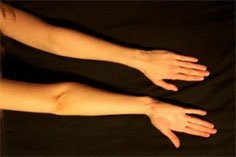You know what a diagnosis after so long gives you? It gives you a hyper-awareness of your body and what you are actually feeling. You start to pay attention to what your body is telling you and actually listen to it.
Which, you know, is great in theory. Unfortunately it means that instead of brushing off any and all pain, I am (stupidly) paying attention to it now.
Cue thoughts like this:
‘Why is my ankle hurting? Hang on, I’ll just stretch it out and OWOWWWW *click* shit. Wait, that’s why my ankle hurts. That bone flicks out. Heh. Who knew?’
Apparently whilst paying attention, I realise just how many bones sublux [I learned a new word, isn’t it pretty? I used to call it clickiness.] during the course of my day. My knee for example flicks to *almost* out quite often. It isn’t quite as painful as a full dislocation, but certainly enough to jolt you back to reality eand make you change position while massaging the fuck out of it.
However, the main thing that a diagnosis gives you, is the right to talk about it.
This shit isn’ t all in my head; brushing my hair is a really fucking exhausting job, even though I cut it short because I was too exhausted to hold my arms up to brush it when it was long. My wrists and fingers do hurt. Some days I am too tired to think straight, even if the kids had a good night.
Because I’m not ‘faking it’ or ‘attention seeking’ or ‘lazy’.
It takes a huge amount of willpower to switch seven years of thinking around and start paying attention to your body. To stop ‘pushing through it’ and start listening to yourself and taking care of yourself.
To realise that this isn’t going away and plan how to minimise it’s impact on the rest of your life.
[Currently recommended: Physio, swimming, low impact exercise, healthy diet… anything else I’ve forgotten?]
I suspect that quite a few doctors in our Tasmanian health system are going to get a crash course education in Ehlers Danlos and the effects and symptoms thereof. My family is not a small one and it appears that David is affected as well as my father’s sisters and possibly their children. [Although, Dad’s baby sister is on the mainland, not down here.]
More to the point, because it is an autosomal dominant gene, it means that the children of affected parents, have a 50% chance of inheriting the gene.
We’re breeding an EDS army down here. We’ll come after you with our shaky joints and we will poke you with our poky fingers. Yes, that’s right, having a genetic condition doesn’t mean our fingers are any less poky. It just means that some of us might hurt ourselves in the poking.
So THERE.


